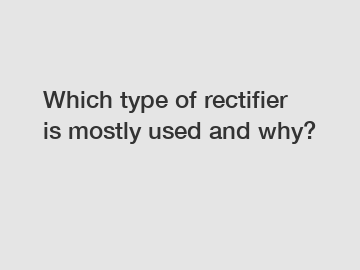Which type of rectifier is mostly used and why?
In today's world, electrical energy plays an indispensable role in our lives. From powering our homes to driving technological progress, the efficient conversion of alternating current (AC) to direct current (DC) has become a necessity. Among the various devices involved in this process, rectifiers hold a crucial position. In this blog, we will explore the most commonly used type of rectifier, understanding why it has earned its prominent status in the industry.
The Bridge Rectifier: Ruling the Roost.
When it comes to rectifier technology, bridge rectifiers stand tall as the most widely used type. It owes its popularity to several factors that make it a go-to choice for numerous applications.

1. Superior Efficiency:
Bridge rectifiers shine when it comes to converting AC to DC. Their configuration allows for full-wave rectification, meaning they are capable of utilizing both halves of the AC input waveform. This results in a more efficient conversion compared to half-wave rectifiers, which only use one half of the AC waveform. The bridge rectifier offers higher average DC output and lower ripple voltage, contributing to better overall performance.
2. Compact Design:
Bridge rectifiers pack a powerful punch in a small package. With its simple circuit arrangement and minimal component count, it boasts a compact design suitable for various applications, including consumer electronics, power supplies, industrial equipment, and automotive systems. This form factor makes bridge rectifiers highly versatile and cost-effective for manufacturers.
3. Enhanced Reliability:
Reliability is a crucial factor in any electrical system. Bridge rectifiers, particularly those constructed using modern silicon-based diodes, offer exceptional reliability and longevity. Silicon diodes have a high forward current rating, excellent thermal stability, and a low reverse leakage current, making them a reliable choice for rectification purposes.
4. Enhanced Voltage Handling:
Bridge rectifiers can handle higher voltage levels compared to other types of rectifiers. This capability makes them ideal for applications that require rectification of higher voltage AC sources, such as industrial power supplies. By utilizing higher-rated diodes, bridge rectifiers provide a robust solution to handle different voltage ranges efficiently.
5. Flexibility in Polarity:
Unlike center-tapped rectifiers, bridge rectifiers eliminate the need for a center tap on the transformer, simplifying the design and reducing costs. This allows engineers to tap into the flexibility of bridge rectifiers by varying the polarities of the output voltage easily. This characteristic finds use in a wide array of applications, offering greater adaptability and design possibilities.
Conclusion:
Bridge rectifiers have become the go-to choice for rectification due to their superior efficiency, compact design, enhanced reliability, voltage handling capabilities, and flexibility in polarity. They find applications in diverse fields, from consumer electronics to heavy industrial systems. As technology continues to evolve, bridge rectifiers remain at the forefront of efficient AC to DC conversion.
In the world of rectification, bridge rectifiers reign supreme, offering a robust and reliable solution for power conversion needs. Their wide adaptability, cost-effectiveness, and efficiency have cemented their place as the most commonly used type of rectifier, trusted by engineers and manufacturers worldwide.
As we move forward, research and development efforts continue to refine the performance of bridge rectifiers, aiming to improve their efficiency, compactness, and reliability even further. With their remarkable qualities, bridge rectifiers are poised to maintain their dominance in the ever-evolving landscape of electrical energy conversion.
Want more information on delta eltek, delta rectifier module, eaton apr48 datasheet? Feel free to contact us.
116
0
0


Comments
All Comments (0)